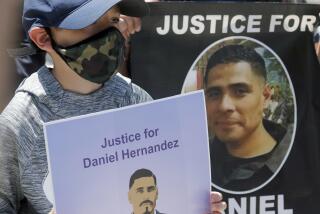Justices to Hear Excessive Force, Immunity Case
- Share via
WASHINGTON — In a case about an animal rights activist taken into custody during a speech by Vice President Al Gore, the Supreme Court said Monday it would decide whether the arresting officer used excessive force and should be denied immunity from being sued.
The high court agreed to review a ruling that allowed protester Elliot Katz to proceed with his lawsuit seeking damages over his claim that a military police officer used excessive force during his 1994 arrest in San Francisco.
Gore and other speakers on Sept. 24, 1994, gave a public presentation at the Presidio military post to celebrate the facility’s conversion the next week into a national park.
While Gore spoke, Katz walked to a barrier separating spectators from the vice president and unfurled a protest banner.
Army Pvt. Donald Saucier and another military police officer removed Katz, 60. Katz, a veterinarian, says he was shoved into a military van and almost injured.
The officers never spoke and left Katz in the vehicle for about 20 minutes, he said. After being driven to a police station, Katz was briefly detained and released without explanation.
Katz sued, alleging Saucier arrested him without sufficient cause and with excessive force.
A federal judge dismissed the other claims but ruled that Saucier was not entitled to partial immunity on the excessive-force claim. A U.S. appeals court upheld the decision.
The Justice Department appealed to the Supreme Court, saying the decision “creates a de facto no-force rule for many arrests and invites inappropriate second-guessing of an officer’s on-the-spot judgment.”
More to Read
Get the L.A. Times Politics newsletter
Deeply reported insights into legislation, politics and policy from Sacramento, Washington and beyond. In your inbox twice per week.
You may occasionally receive promotional content from the Los Angeles Times.










